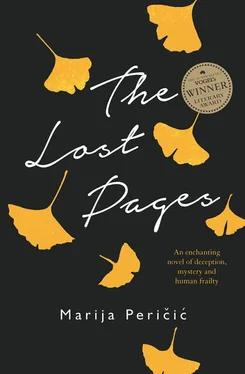In the mornings I would open the door and discover him waiting outside on the landing, as if he had been standing there all night, which perhaps he had been. He would write letters to Franz, leave him small gifts, and send endless invitations for dinner or to the theatre. In the afternoons he would take a chair out onto the middle of the lawn, place it under our window, and simply sit and look up at it for hours. I had no idea how he had even found out which window was ours. He somehow managed also to discover which places we were to visit, and we would chance upon him in the corridors of museums, standing silently among some Roman sculptures or sitting on a park bench in Karlsbad, or we would catch sight of the top of his hat bobbing up and down at the other end of the train compartment.
He was always perfectly polite and reserved when we met him, and would calmly discuss some point of interest in the museum or the park as though his obsessive attentions did not exist. This was completely unlike the way he expressed himself in his letters, which were more like ardent declarations of love. I found this dissonance extremely unnerving.
To Franz, the whole thing was highly amusing at first; guessing where Klopstock would next appear became like a little game between us, the reading of his letters became a daily ritual, and these diversions greatly improved the cooled relations between Franz and me. Before long, the frequency of Klopstock’s letters increased and he began to outline his plans for moving to Prague to be close to Franz, and then at last Franz began to feel uneasy.
I was able to track down Dr Jensen and discovered that Klopstock was a psychiatric patient in his care. Jensen was a keen proponent of therapies that involved building a healthy body to build a healthy mind, and he was much given to experimental treatments for obsessive psychiatric disorders. He was insistent that Klopstock remain in the town for the planned duration of his cure, saying that to move him away now would have fatal consequences for his recovery.
The situation began to wear on Franz’s nerves. As well as Klopstock, amusing though he may have been, Franz also continued to be courted by the other guests. He still spent his time endlessly writing letters and fending off advances from all sides. It became unmanageable and he began to barricade himself in our tiny room to avoid encountering anyone, and had his meals sent up to him.
One result of this was that Franz felt unable to make the necessary tours of the area, so I spent long afternoons trailing through empty museums and dark churches alone, noting down every detail. I spent one whole day sampling each variety of spa wafer, both hot and cold, and weighing their relative merits. It took days to taste the water at each of the town’s thirteen main springs, mostly because the taste was so vile that I could only manage to force the stuff down a few times a day. Even today I can still recall the taste of those springs: a warm mixture of citrus and rust that lingered on the palate for hours. I was pressed by competing local shopkeepers to try out any number of patented cups and drinking vessels designed especially for the Karlsbader water, each claiming to provide the best way for the body to absorb the water’s healthful magic.
I took various bath cures at the Kurhaus, of varying levels of ignominy. I had my gums irrigated. I tried hydrotherapies of various means: being sprayed with a hose attached to a pneumatic pump in what I found to be a most undignified procedure, and being immersed in pools and springs. I was locked in a kind of sauna, which was referred to as ‘a cupboard for sweating’. This was a wooden box that fitted around the body and had a small opening that clamped around the neck. Steam from the springs was pumped into this box, but I failed to reap the miraculous benefits of rejuvenation that it promised.
I was initially self-conscious at the thought of exposing my body to the nurses and physicians at the Kurhaus, but even a few short hours of walking around the streets of Karlsbad allayed my worries, for it was immediately apparent that the place was a carnival of illness and deformity. I was certainly no longer alone in my difference in that place, for the streets were teeming with the diseased, the misshapen and the infirm, many of whom could not even walk, all hoping for a miraculous cure. We physical freaks seemed to dominate in number over the ordinary able-bodied. And indeed, even those who appeared to be normal from a distance would often on closer inspection be plagued with wheezing breath, rheumy eyes or lurid crops of facial pustules.
I was partly relieved at being spared Franz’s company on all these outings I made in aid of the travelogue, but at the same time his absence annoyed me. For all those hours that I was searching my way through unfamiliar towns to discover a recommended place or enduring uncomfortable treatment regimes, Franz was locked up in our room diligently writing. I would come back from an exhausting day of sightseeing or hydrotherapy and interrupt his scribbling. The very sound of his pen scratching across the page filled me with resentment. A few times I asked him what he was writing, but he would never tell me.
The only writing that I was managing to complete was my sightseeing notes and the letters to Anja that I never posted. Franz and I had made the arrangement that if I was to undertake the sightseeing, then he would transcribe the notes that I had made on the trip, in order to balance the workload between us; an arrangement that I still felt to be unfairly weighted in his favour.
Every evening I took out the notes that I had made during the day, together with brochures and maps that I had collected, and placed them on the little writing table in our room. [15] Blank postcards of Karlsbad and train schedules were found between these pages of the manuscript.
After more than a week these papers had amassed into a vast pile that grew larger every day, never appearing to make the transformation into the elegant prose that Theodor was expecting.
I asked Franz a few times about his progress with this, whether he had finished any transcriptions that he would like me to proofread, but he never had anything to give me. He complained that my handwriting was too difficult to read, and blamed this for his slow progress. I asked him then if he would like me to proofread any of his other writing. But no matter how often I asked Franz always declined to pass on any of his writing. He had become uncharacteristically evasive about it, and for some reason this nagged at me. Perhaps my nerves had been affected by living in the tense atmosphere of that hotel, constantly on guard against overfamiliar strangers seeking me out, not to mention Klopstock’s enduring obsession. I found myself constantly worrying about the question of what Franz was writing as though it would have some catastrophic consequence for me.
Possibly this reaction had come from the Gregor situation, which had put me on edge. Whenever I thought of Gregor I became stilted and silent in Franz’s presence and tried to reveal as little of myself as possible, frightened that he might again be observing me for idiosyncrasies with which to pin me to the page. As the days passed I became more and more paranoid about the subject of his writing. When I came back to the hotel in the evening, I could hear him at work from the other side of the door to our room. The pen made a jagged scrabble on the paper, like an animal sliding through dry grass.
I stood silently outside the door of our room and held my breath and listened, as though the pen were a voice that could speak to me through the wood of the closed door. I would stand there for a long time before I proceeded to open the door with care. This was a delicate procedure. I laid my fingers lightly over the lever of the brass handle at first, slowly increasing my grip until my knuckles shone out white. The door was never locked. I would depress the handle with extreme slowness, as the spring mechanism inside ticked. I held my breath and swung the door gently on its hinges, millimetre by millimetre, my eyes on the slowly growing wedge of our room that emerged from between the door and the doorjamb.
Читать дальше












